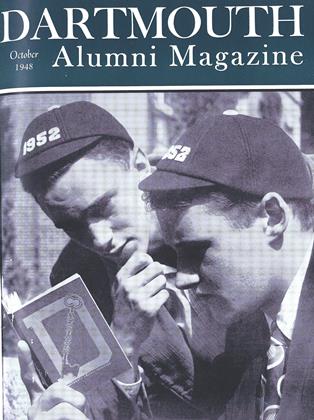by CarlosBaker '32. Princeton University Press, 1948,307 pp., $5.00.
Matthew Arnold might well be surprised that "the beautiful and ineffectual angel" he captured on a critical pin is today the subject of perhaps more books than any other Nineteenth Century poet. The studies of Shelley, however, have tended to be huge cairns of biographical minutiae or tenuous explorations of one preoccupation of that brilliant and highlystored mind. Prof. Carlos Baker has given us what the serious student has wanted, an orderly and broadly-based reading of Shelley's intellectual history as it is recorded in the major poems of the intense decade 1812-1822.
The subtitle (The Fabric of a Vision) is a very precise description, for Prof. Baker has traced the widely derived strands of that fabric which carried the difficult and dazzling vision of Shelley's poetry. Because his scholarship is sound and broad, he is able to place Shelley centrally in the great tradition of European culture without denying his mythopeic originality. Moving from poem to poem, rather than following some a priori thesis, he asserts the full experience Shelley was attempting in each poem and watches the development of his mind through the poem into that which follows. Necessarily, perhaps, this somewhat neglects the protean fertility of Shelley's li quescent imagery, but it measures properly the high seriousness with which the poet tried to arch the chasm between actuality and vision, that Romantic dilemma which he so variously attacked. The method proves its validity by the fuller understanding it evokes, particularly of the last great poems, "Epipsychidion," "Adonais," and "The Triumph of Life."
Shelley's Major Poetry is an excellent study of the best sort: an erudite and honest effort sensitively to understand the complex of thought, ethics, and philosophy out of which a creative mind derived the symbols and images which lifted its thought to art. As such it always points beyond itself to the poetry for which it educates one.
 View Full Issue
View Full Issue
More From This Issue
-
 Article
ArticleShould the Athlete Rate a Preference?
October 1948 By EDWARD T. CHAMBERLAIN JR. '36 -
 Class Notes
Class Notes1918
October 1948 By ERNEST H. EARLEY, DONALD L. BARR, DAVID L. GARRATT -
 Class Notes
Class Notes1921
October 1948 By DONALD G. MIX, ROBERT M. MACDONALD, ROBERT P. BURROUGHS -
 Class Notes
Class Notes1926
October 1948 By E. PAUL VENNEMAN, HERBERT F. DARLINC, ROBERT M. STOPFORD -
 Class Notes
Class Notes1917
October 1948 By KARL W. KOENIGER, DONALD BROOKS -
 Class Notes
Class Notes1912
October 1948 By HENRY K. URION, RALPH D. PETTINGELL, HENRY B. VAN DYNE
ALLAN MACDONALD.
Books
-
 Books
BooksTHE HOLY SLICE.
February 1974 By H. KARL LUTGE -
 Books
BooksA MATTER OF LIFE AND DEATH.
MAY 1971 By H. SHERIDAN BAKETEL JR. '20 -
 Books
BooksBriefly Noted
MARCH 1969 By J.H. -
 Books
BooksRake's Progress
March 1977 By JAMES L. FARLEY'42 -
 Books
BooksSONG and IDEA
March 1941 By John Holmes. -
 Books
BooksECONOMIC EDUCATION.
NOVEMBER 1965 By WILLIAM LEE BALDWIN




